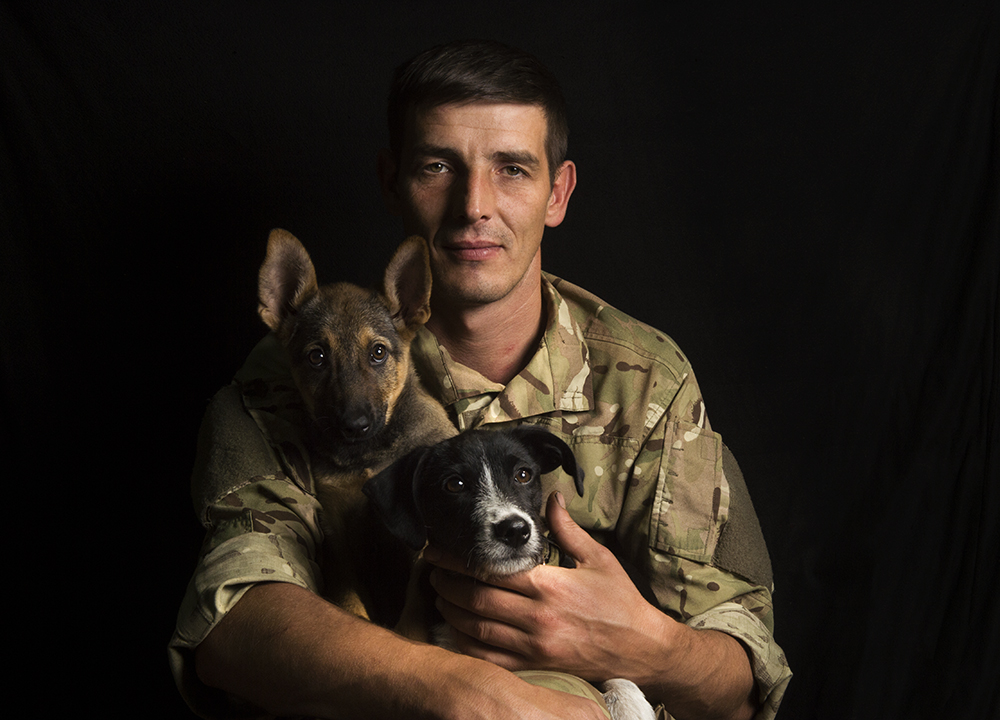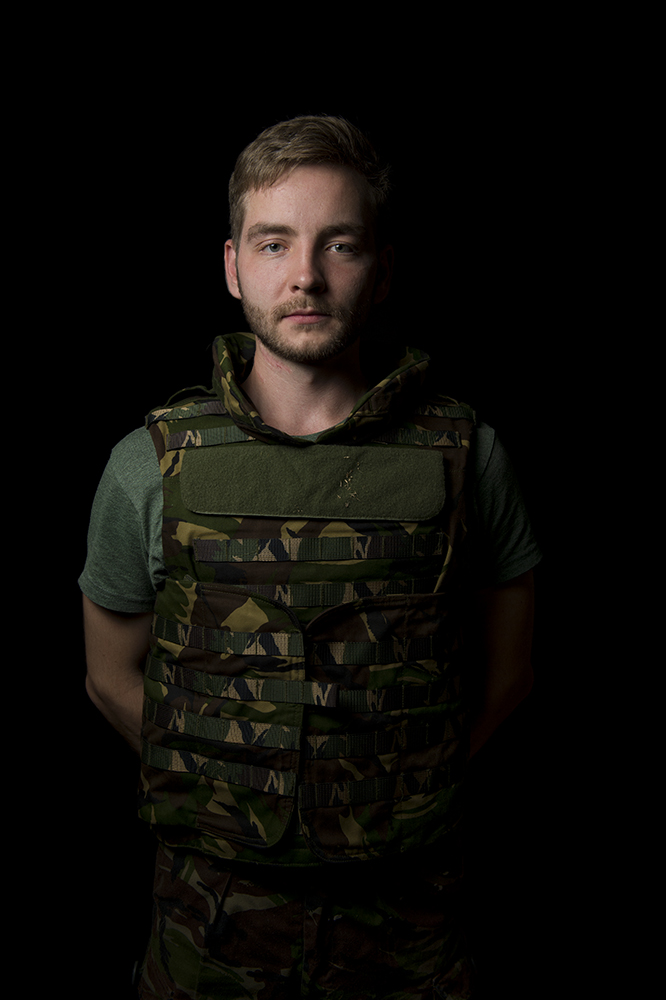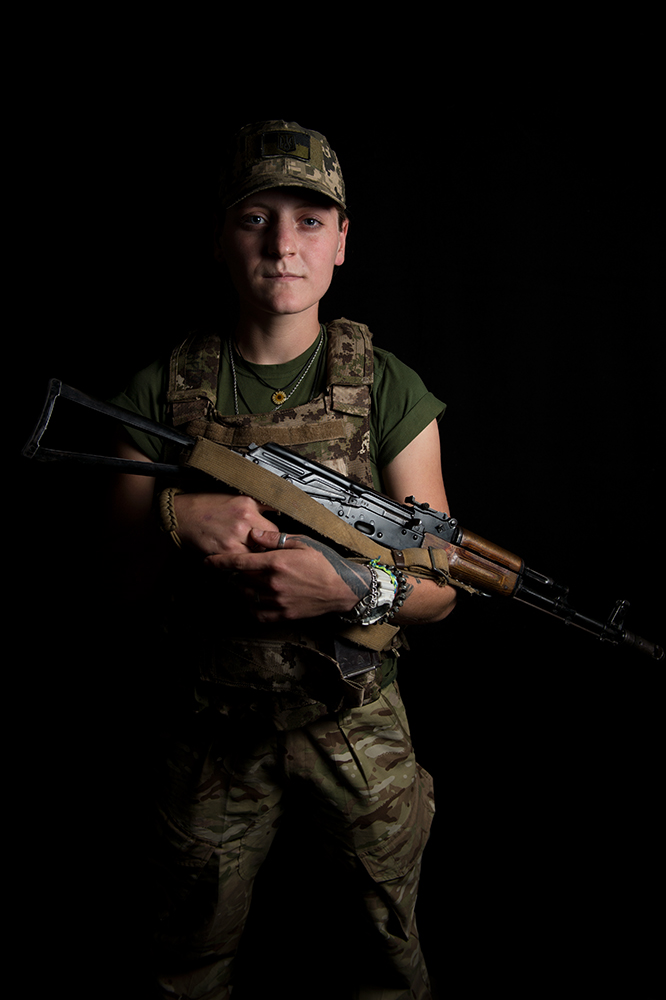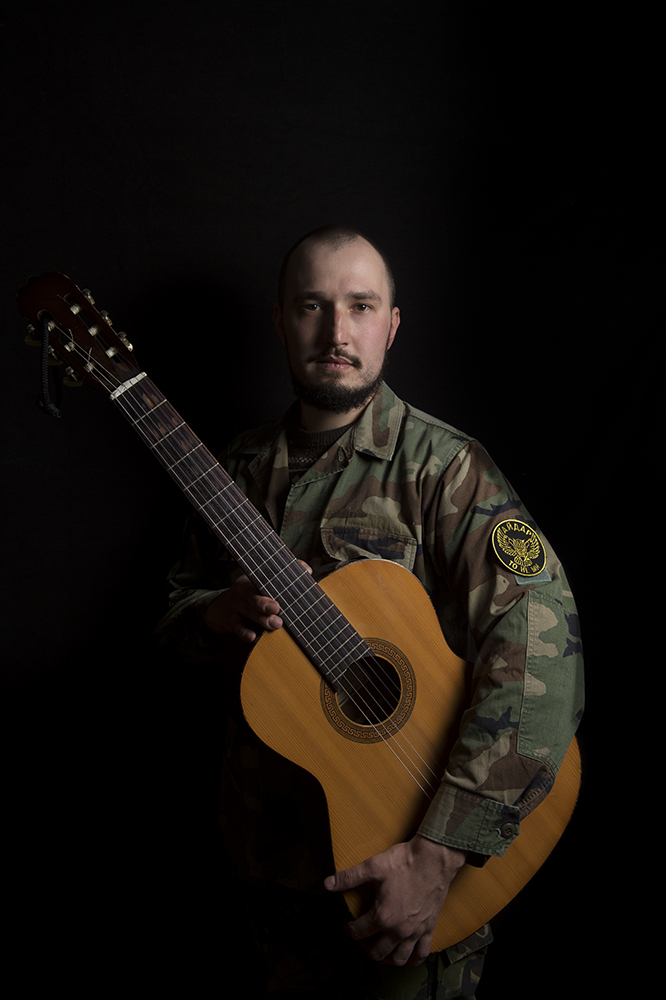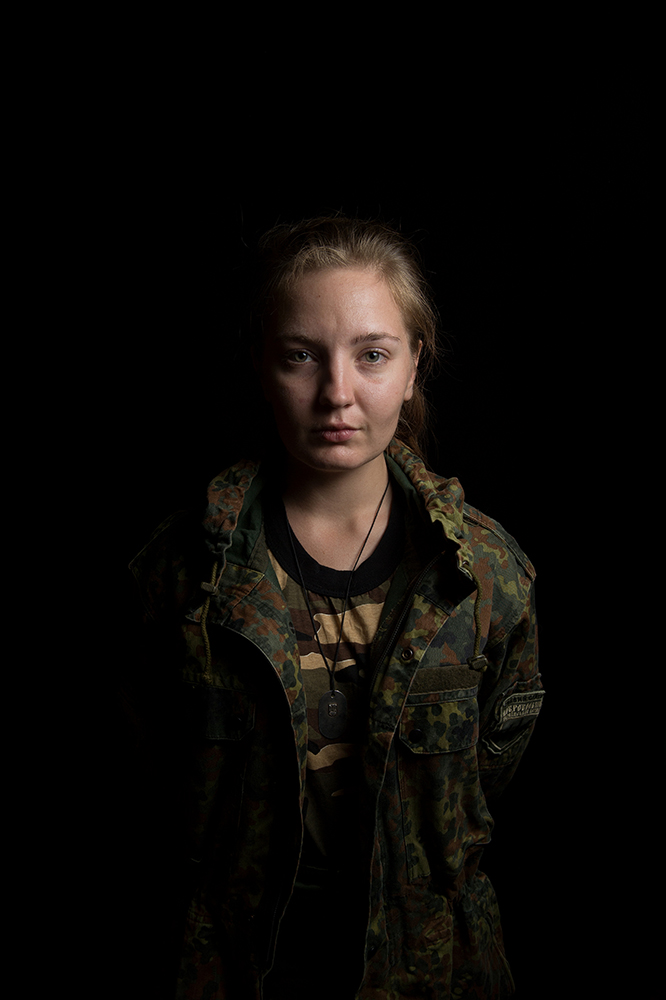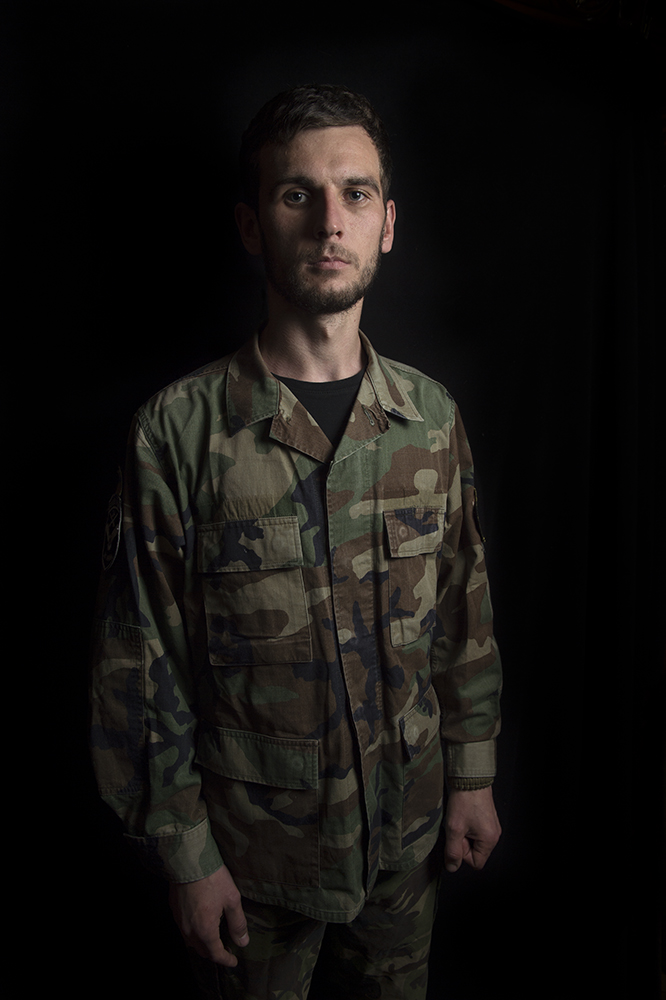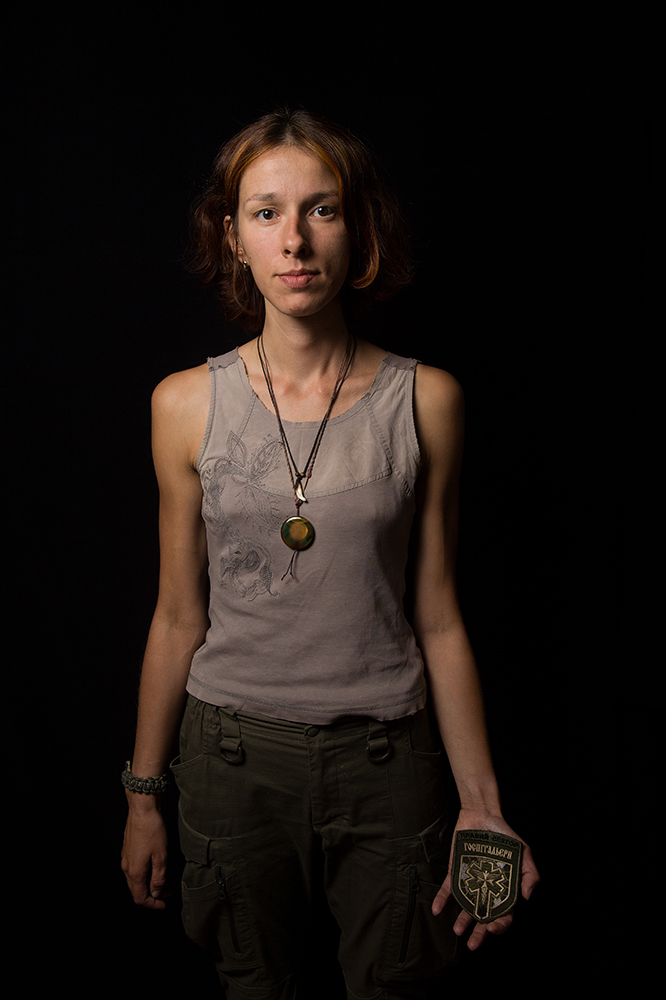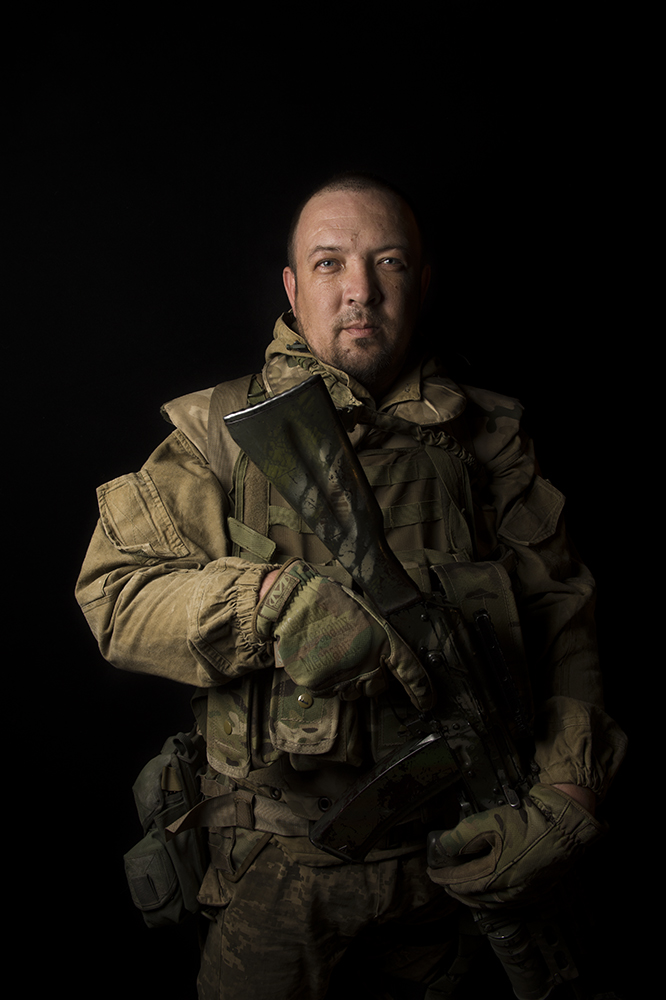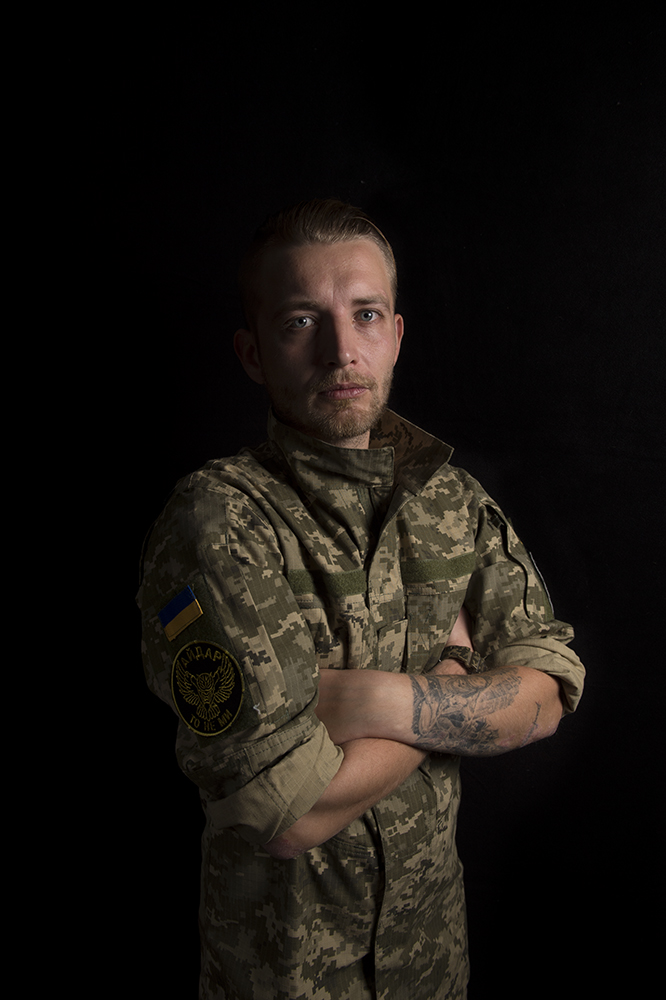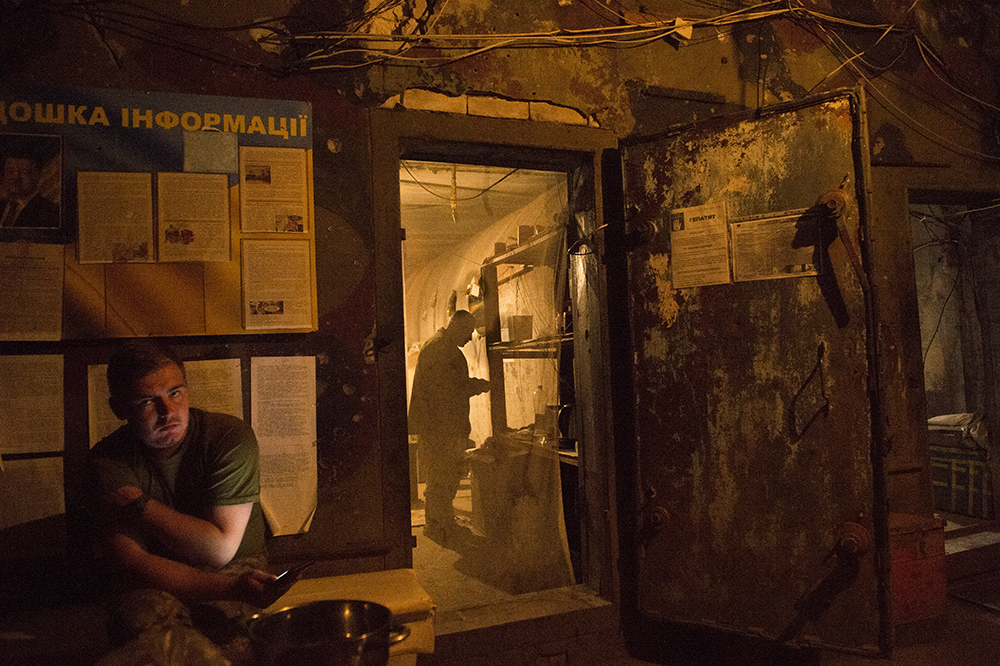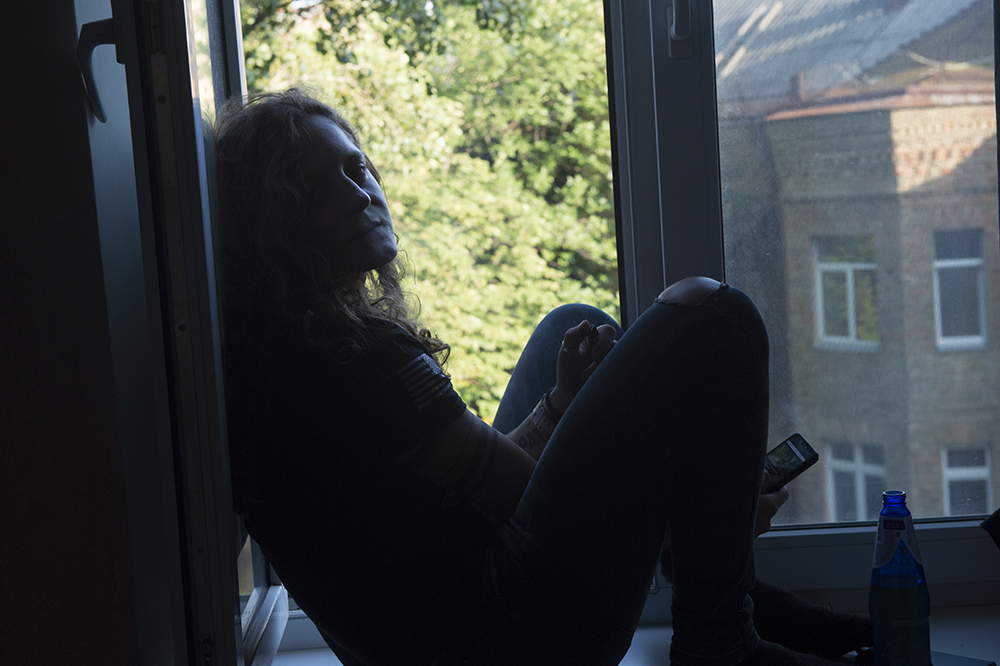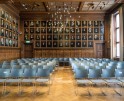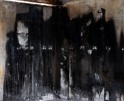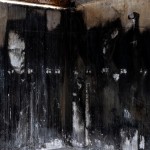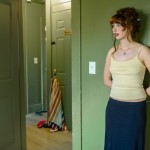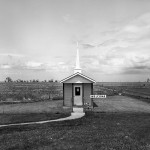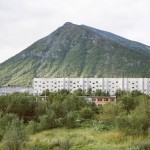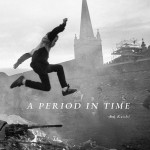J.T. Blatty: Frontline–Peace Life: Ukraine’s Revolutionaries of the Forgotten War
“I am still good towards the Russians, they are people like us, normal people. Even the military. A Russian soldier is given an order, it’s his job, he is given an order, he obeys it and leaves to execute it. If he denies to obey an order, he will go to jail. These soldiers have families, children, they understand they have no choice. They chose to be military men. The problem is with those who give orders, not with the people who execute them.”
Photographer, Documentarian, and American War Veteran, J.T. Blatty has a lifetime of considering war. After graduating from West Point, she deployed with the first troops into Afghanistan following 9/11 and again into Iraq during Operation Iraqi Freedom. She now uses the perspective of soldier to examine all sides of conflict around the globe. J.T. has a new project and exhibition, Frontline––Peace Life: Ukraine’s Revolutionaries of the Forgotten War at the Ukrainian Institute of America, 2 E 79th St, New York, NY. The show through March 25 2020, with a second opening reception on March 6, 2020, 7-9 PM.
The exhibit features 20 life size portraits of Ukraine’s 2014 volunteers, each combined with text excerpts from their oral history recordings. In addition, there are about 20 photojournalistic prints covering the conflict in the Donbas and the 2014 volunteers moving from the front line to the “peace life,” combined with additional excerpts/stories from oral history recordings and a 20-minute multimedia video featuring photojournalistic photos, and audio from the oral history recordings. All portraits were taken on location, in various locations on the frontline of the Donbas and within Kyiv.
J.T. shares her insights into the genesis of this project: I came to Ukraine as a U.S. combat veteran and photojournalist two years ago, drawn to the community of the soldier, inspired to document and preserve a form a patriotism that was so far from my own reality of fighting wars, under contracted obligations. But over time, the project became far more than making the invisible visible and the unheard heard. There is a common thread amongst most war veterans around the world, an ultimate realization that in our wars, we were pawns in a larger agenda that we might never understand. The volunteers were not pawns in 2014, but now their story needs to be told more than ever, because their story is so far from over.
Jenn Tuero (J. T.) Blatty graduated from the United States Military Academy at West Point in 2000 and served six years as an active-duty U.S. Army officer, deploying with the first troops into Afghanistan following 9/11 and again into Iraq during Operation Iraqi Freedom. After completing her service to the military she pursued photography and writing as her career. Blatty is the author of Fish Town: Down the Road to Louisiana’s Fishing Communities, a FEMA disaster reservist photographer, and a photojournalist whose photographs and articles have been published in Bloomberg Businessweek, PDN Magazine, Savannah Magazine, The Daily Beast, The Oxford American, and CNN Photos amongst others. Since early 2018, she’s been working with Ukraine’s volunteer soldiers and veterans of the war in the Donbas. The project, Frontline–Peace Life: Ukraine’s Revolutionaries of the Forgotten War, is currently on exhibit at the Ukrainian Institute of America in New York City through March 25, 2020.
“We returned to the point where the guys were killed in search of someone who survived. But everybody was killed, twelve of them, dead at one time. So I was standing . . . just in the middle of that hell, seeing how the bodies were unnaturally positioned . . . like dolls. I’m used to seeing these guys when they were alive. I couldn’t recognize them.” – Dmytro Lavrenchuk
Frontline–Peace Life: Ukraine’s Revolutionaries of the Forgotten War
“I signed another contract, which is currently coming to an end. When the question of going back to the peaceful life arises …you see that your child is already four years old and you have to carry on and try to escape the war. It’s very difficult, it’s impossible in Ukraine because it’s … when you have that moment when you’re reading the news or friends call you from ATO, and you understand that the war isn’t over yet. And I promised to myself when I was burying Vadim that I wouldn’t stop, I will be here until the end, until the war is over. Now I understand that it’s far from over, it’s a dead end. I will try to leave but if my help is needed at the front — I will come back again. It’s something you can’t just abandon. It’s like a drug. If you’re on it, you can’t go away from it.” – Yulya Tolopa
Valkyrie––her war name. In Norse mythology, chooser of the slain in battle. A Russian citizen fighting for Ukraine since she was 18, she stands on a chair around a breakfast table inside of a flat in Kyiv, quiets the youthful brouhaha of the room as she speaks, then pours half of her glass of whiskey to the floor by my feet. The others follow her lead, including myself, because I know what they are doing: honoring the fallen. We’ve done it other times, where these soldiers and veterans of the war in eastern Ukraine have come together to congregate, to celebrate, to remember and to forget, and to tell war stories among comrades and even myself, a veteran of two other wars, from an Army in a country so far removed from their reality.
Valkyrie is the face of a generation––she is one of the thousands of ordinary men and women, who in 2014, following Russia’s annexation of Crimea and the Revolution of Dignity in Kyiv, self-deployed into eastern Ukraine to fight a war against a Russian-backed insurgency. Entirely of their own free will, these individuals were not paid, were not conscripted by the government, and most had no military training. They voluntarily abandoned everything they knew to fight for their homeland, their fellow citizens, their civil rights and their vision for a life free from government corruption.
As this undeclared war nears its sixth year, now under tenuous control of Ukraine’s government, casualties continue to rise on both sides and the global stage has been made aware of the plight. And the 2014 volunteers who endured the most violent period of the conflict, many who remain undocumented for their participation, face a new struggle. To speak nothing of the physical and psychological injuries they carry, how can they abandon a war when it’s is still ongoing, in such close proximity and without a resolution in sight? How can they begin the process of healing and reintegration when their comrades are still taking up arms and dying a six-hour train ride away? How do they rest when the impetus that caused them to risk everything, that they lost so much for, still looms so large and seemingly in vain? The answer to most of these questions is that they cannot.
I came to Ukraine as a U.S. combat veteran and photojournalist two years ago, drawn to the community of the soldier, inspired to document and preserve a form a patriotism that was so far from my own reality of fighting wars, under contracted obligations. But over time, the project became far more than making the invisible visible and the unheard heard. There is a common thread amongst most war veterans around the world, an ultimate realization that in our wars, we were pawns in a larger agenda that we might never understand. The volunteers were not pawns in 2014, but now their story needs to be told more than ever, because their story is so far from over. – J.T. Blatty

©J.T. Blatty, Install of Frontline––Peace Life: Ukraine’s Revolutionaries of the Forgotten War, Ukrainian Institute of America
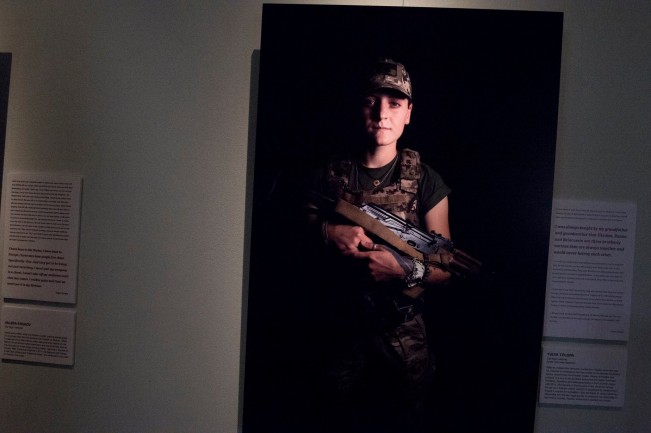
©J.T. Blatty, Install of Frontline––Peace Life: Ukraine’s Revolutionaries of the Forgotten War, Ukrainian Institute of America
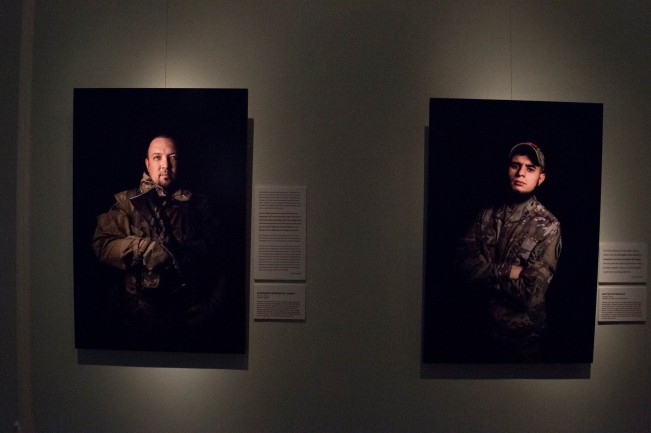
©J.T. Blatty, Install of Frontline––Peace Life: Ukraine’s Revolutionaries of the Forgotten War, Ukrainian Institute of America
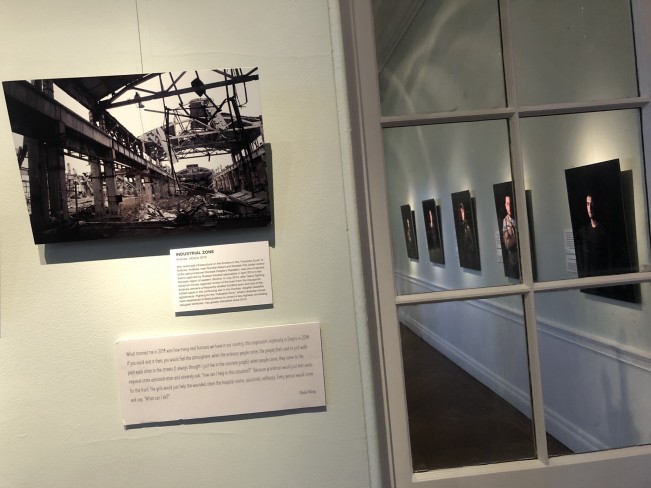
©J.T. Blatty, Install of Frontline––Peace Life: Ukraine’s Revolutionaries of the Forgotten War, Ukrainian Institute of America
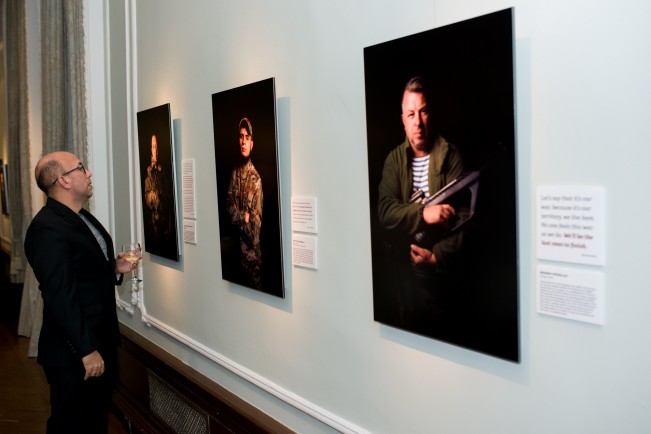
©J.T. Blatty, Install of Frontline––Peace Life: Ukraine’s Revolutionaries of the Forgotten War, Ukrainian Institute of America
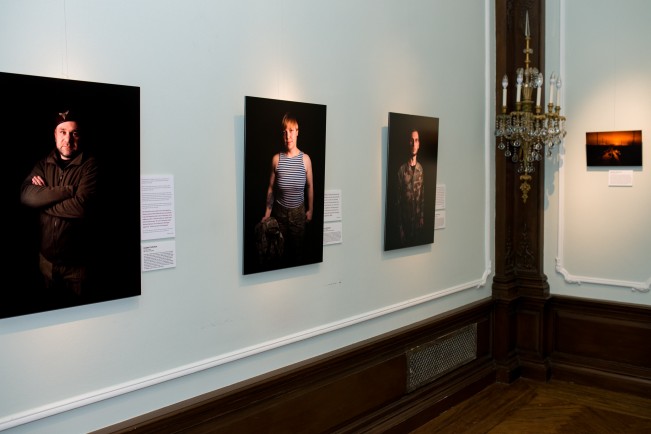
©J.T. Blatty, Install of Frontline––Peace Life: Ukraine’s Revolutionaries of the Forgotten War, Ukrainian Institute of America
“We searched for an organization that could bring us to the front. Someone informed us that there is the “Aydar” battalion which was already east and participating in combat. We just rented a bus and went there. We thought this battalion was a regular unit, but when we joined we realized that it was absolutely self-proclaimed. It was a gang of patriots. I only saw these things in the movies, but this was real. Everyone had a civil profession. I was a biologist, Valera was a businessman, Babay was a culturologist, Mikhas was a historian.
Imagine we are there, 40 people, and the officer asks: ‘Who is not eighteen years old yet? Who’s been to prison?’ Then ‘who has no experience in the military at all?’ The entire group of forty people raised their hands.” – Bizhan Sharapov
“I actually thought that when I encounter the first casualty, when I see the first death at war, somebody I was working with would die, I thought I would maybe remember his name . . . I don’t know, at least I would remember his name. But I don’t remember what his name was.
There is a journal for the wounded where we write down their first name, last name, patronymics, of the killed. I thought I am writing this down here and maybe I will remember his name for the rest of my life. But already I don’t remember his name. The ones who die, they all become alike, as if they had the same face and you can’t remember. At least that is how it is for me.” – Uliya Sidorova
“Sometimes I have this feeling that someone can just throw a grenade, or I can go to the window to find a sniper. Sometimes I can’t step on grass or a field because . . . I know it can’t be dangerous in Kyiv, but I think the unconscious part of my brain still thinks that it can be dangerous. And when I’m talking about these things I feel a lot of fear. Because I’m not sure it can be, in real life, all these things like nuclear weapons and Russian tanks in Kyiv. But we never thought that Russian tanks could be in Donetsk before it happened. So I’m not sure we need to be so relaxed about it.” – Alina Viatkina
“When I finally made my way out of there, I went to Kyiv. I slept a few hours on my backpack at the railway station and then decided to go into the city and down to the subway. I saw all the crowds of people moving around and I couldn’t understand what was going on as a day ago I was in the war zone and then I was in a different reality. One day I was in Shchastya and the next morning I was in Kyiv. There was no consecutive change of understanding.” – Vasyl Antoniak
“Sometimes I wake up at night and don’t remember where I am. I changed a lot of places in a short amount of time. I don’t have a normal reaction when someone is shooting fireworks. It’s really strange because I’m completely calm on the frontline now when artillery falls close to me. I have no fear. But I have such fear here.” – Olena Maskymenko
“He is sick. I am sick. My commander’s sick. We’re sick of war. And when the war is finished … we don’t know what we will be doing when the war is finished.” – Oleksandr Yermoshyn
“75 percent of people in Ukraine are tired of war. But 25 percent not tired, maybe me, maybe Yulya, my friends and my parents. Those who were affected by the war, they do not get tired. ‘I’m tired,’ they say. How are you tired? You go to work, you go dance, you have a girlfriend, you have a car. How are you tired? People are beginning to forget. But we don’t forget. No. People that do not bury their friends do not understand.” – Trotsky
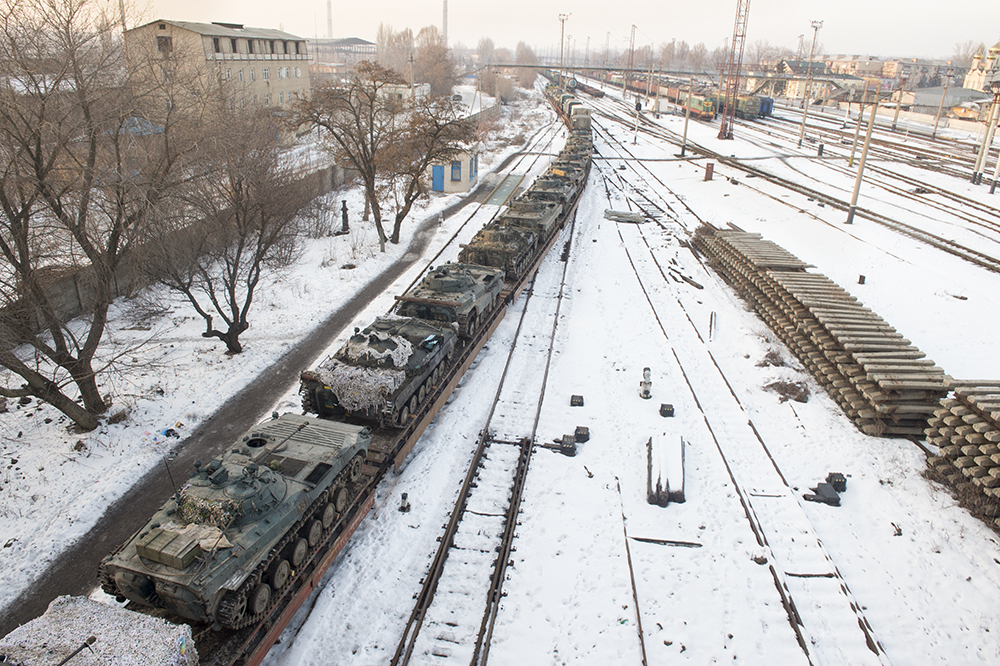
©J.T. Blatty, Kostyantynivka: Kostyantynivka, Ukraine 2019 Armored Personnel Carriers (APCs) on the railroad tracks in Kostyantynivka, the arrival and departure point for many soldiers traveling back and forth from the frontline to the peace life, a six-hour express train-ride away from Kyiv. Kostyantynivka, an industrial city of the Donbas approximately ten miles from the frontline, was captured by the Russian-backed separatists in April 2014 and later retaken by the Ukrainian forces in July 2014.
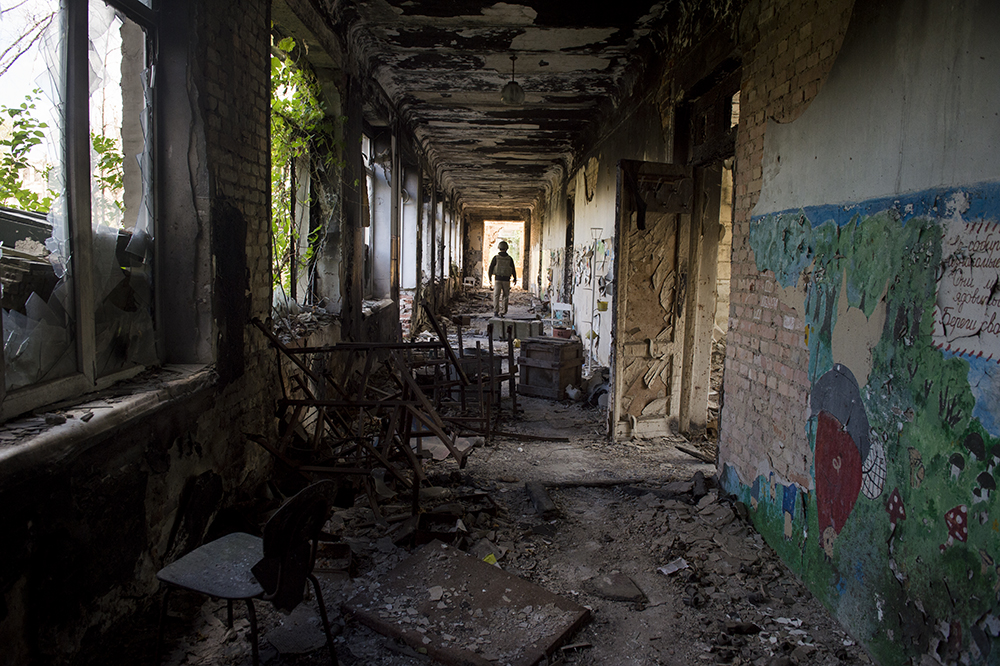
©J.T.Blatty,Pisky, Ukraine 2018 A war destroyed school in the frontline town of Pisky. Before the war, Pisky had a population of approximately 2,000 residents. In 2014, it became a major battleground during fighting for the Donetsk Airport, which ultimately fell to the Russian-led “separatists” in 2015. As of 2016, less than 20 residents remain in the war-destroyed village, living amongst the soldiers who continue to hold defensive positions in the ongoing war.

©J.T.Blatty, Kyiv, Ukraine 2019 Aydar volunteer veterans raise glasses to commemorate a 2014 comrade at his memorial service in Kyiv after his unexpected death.
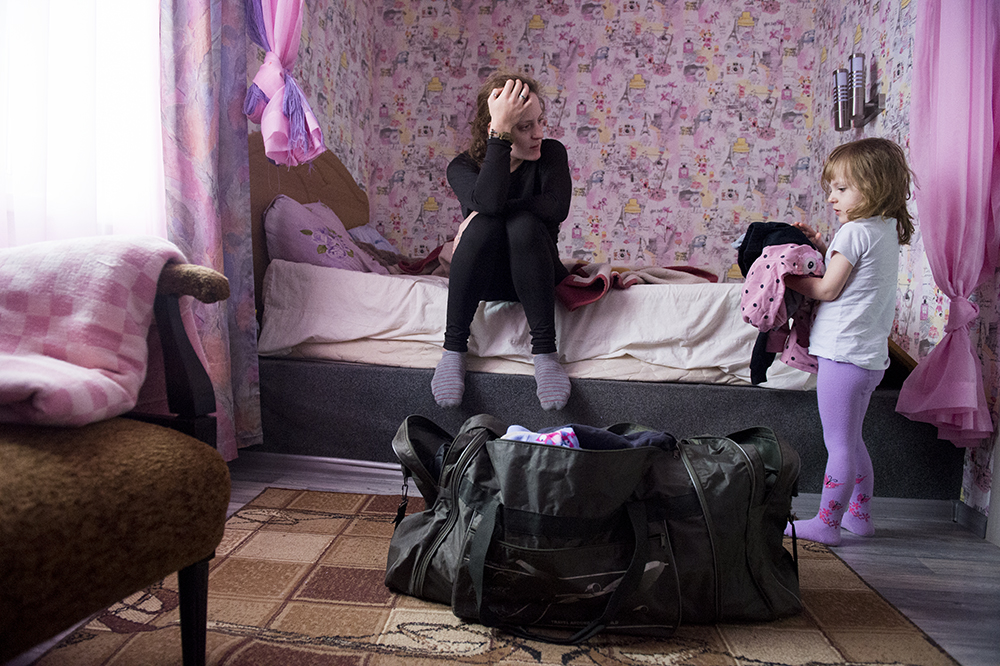
©J.T.Blatty, Frontline Holiday: Kostyantynivka, Ukraine 2019 Yulya Tolopa, “Valkyrie,” UAF soldier and 2014/2015 Aydar volunteer veteran, packing the suitcase of her daughter, Miroslava, to depart home to the family that cares for her during Yulya’s service on the frontline of the war. The two were able to spend a week together in a rented flat in Kostyantynivka, an industrial city in the outer conflict zone (15 miles from the frontline), for the holidays, in between Yulya’s shifts working on the frontline near Horlivka. Yulya is a Russian citizen who left her country to fight for Ukraine. She is protected by Ukraine from Russia’s request from extradition, but still fights to obtain Ukrainian citizenship.
Posts on Lenscratch may not be reproduced without the permission of the Lenscratch staff and the photographer.
Recommended
-
Review Santa Fe: Leslee Broersma: Tracing AcademiaFebruary 11th, 2026
-
Review Santa Fe: Ilana Grollman: Just Know That I Love YouFebruary 10th, 2026
-
Review Santa Fe: Julia Cluett: Dead ReckoningFebruary 8th, 2026
-
Review Santa Fe: Elizabeth Z. Pineda: Sin Nombre en Esta Tierra SagradaFebruary 6th, 2026

